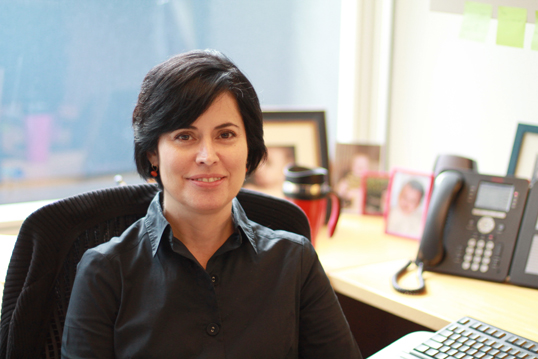 Developmental psychologist Teresa Mitchell, PhD, is fascinated by how children learn. Years ago, as a new behavioral analyst working at a school for the deaf, she noted the students compensated for what they could not hear with enhanced visual focus and perception.
Developmental psychologist Teresa Mitchell, PhD, is fascinated by how children learn. Years ago, as a new behavioral analyst working at a school for the deaf, she noted the students compensated for what they could not hear with enhanced visual focus and perception.
It’s a powerful observation, and one that strongly influences her research into helping children on the autism spectrum learn how to communicate and develop.
“We’re asking not what people with developmental differences can’t do, but rather what they can do,” said Dr. Mitchell (at right), assistant professor of psychiatry and a researcher at UMass Medical School’s Eunice Kennedy Shriver Center.
From that first job, Mitchell went on to graduate school, earning a master’s in counseling psychology and deafness rehabilitation and a PhD in developmental psychology. Since then she has been pursuing research that illuminates “islands of competence”—areas where individuals with atypical development are able to learn or compensate—in order to reveal potential pathways for developing or improving educational interventions.
Much of her research has been focused on deafness, including studies that measured cross-modal plasticity, which Mitchell explains as “how and whether the visual modality adapts to compensate for the absence of auditory input and experience.”
After joining the Shriver Center in 2002, Mitchell began to expand her research into how children on the autism spectrum learn, but her focus stayed on how developmental differences affect learning.
“I was asking the same questions, but with a different population,” said Mitchell of her first large ASD-focused project with colleague William McIlvane, PhD, professor of psychiatry and director of the Intellectual and Development Disabilities Research Center of the Shriver Center.
Mitchell hopes that her research will ultimately lead to better interventions in the areas where individuals with autism spectrum disorders are able to learn effectively, regardless of where they are on the spectrum.
She has just begun another long-term study with Dr. McIlvane that will look at levels of arousal (how susceptible individuals are to environmental stimuli) in children with autism and how that shapes learning. The research team will be using both skin conductance and brain waves to measure levels of arousal and cognitive engagement. The hypotheses is that levels of arousal—either hyper or hypo—determine how children on the autism spectrum learn and by understanding where that learning takes place, better interventions may be possible.
“A lot of studies have involved high functioning children with autism and as a result, interventions have been developed to help them learn. But children on the far ends of the spectrum have not necessarily benefitted from these interventions,” said Mitchell. By determining levels of engagement and arousal, it may be possible to develop interventions for a population that currently has tremendous difficulty learning in any environment.
Faculty in Focus is an occasional feature on UMassMedNow, profiling the faculty at UMass Medical School.